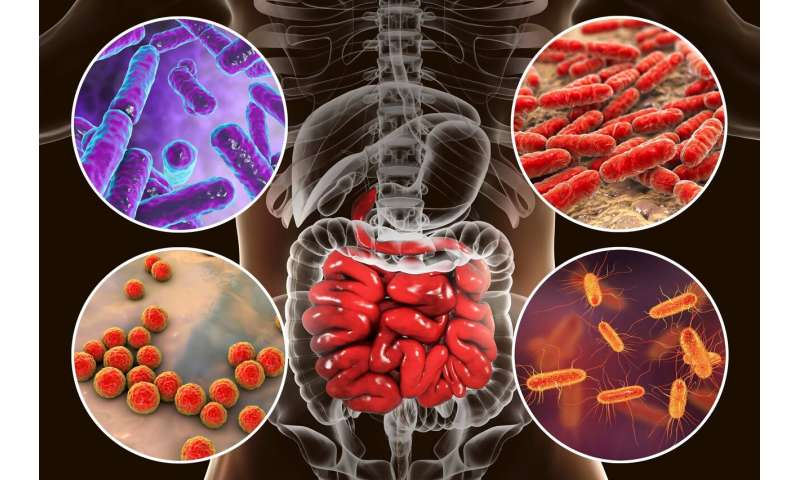.

Credit: Mayo Clinic
What causes some people to develop chronic diseases such as rheumatoid arthritis, cancer and metabolic syndrome while others stay healthy? A major clue could be found in their gut microbiome—the trillions of microbes living inside the digestive system that regulate various bodily functions.
To utilize the huge population of tiny organisms as a proxy for people's well-being, Mayo Clinic researchers have developed a Gut Microbiome Health Index. This index distinguishes a healthy microbiome from one that is diseased.
In a new study published in the Sept. 15 issue of Nature Communications, the researchers reveal how their index, composed of a biologically-interpretable mathematical formula, can take a gut microbiome profile from a person's stool sample to reveal the likelihood of having a disease independent of the clinical diagnosis.
"This discovery advances our understanding of the composition of a healthy gut microbiome that has been long sought after," says Jaeyun Sung, Ph.D., the corresponding author. "Our index predicts how closely a gut microbiome sample resembles healthy or unhealthy conditions." Dr. Sung is an assistant professor of surgery, Mayo Clinic College of Medicine and Science, and researcher within the Mayo Clinic Center for Individualized Medicine Microbiome Program.
Gut microbiome's effects on health
Dr. Sung says the effects of the highly complex microbiome on human health are profound, but the science around how to properly detect whether anything could be wrong, and how to apply the gut microbiome as an indicator of general health is relatively new. What's known is that the ecosystem of microbes is tied to a host of health benefits, including helping to digest food, regulating metabolism and playing a role in immunity. Still, many questions remain. Recent studies link alterations in the gut microbiome to major chronic illnesses. Dr. Sung says a lack of analytical tests or algorithm-driven biomarkers hinders the detection of early signs of disease prior to the occurrence of specific, diagnosable symptoms.
For the new study, Dr. Sung and his team analyzed 4,347 publicly available human stool shotgun metagenomes, which allow researchers to extensively sequence all genes in all known organisms present in a stool sample. The samples were pooled across 34 published studies spanning healthy conditions and 12 non-healthy disease conditions. Nearly 1,700 of the gut microbiome samples were from non-healthy people, that is, those with a clinically diagnosed disease or abnormal body weight based on BMI. Nearly 2,600 samples were from people reported as healthy, that is, with no overt disease or adverse symptoms.
"We pooled together the non-healthy samples into one group and the healthy samples into another," Dr. Sung explains. "Then we did a comparison of the frequencies of the microbes that were observed in both groups. We found some microbes are much more frequently observed in the healthy group, compared to the non-healthy group and vice versa.
His analysis led to a microbiome signature of the healthy human gut composed of 50 microbial species.
"But the real challenge then was to apply this information to design an indicator of health," Dr. Sung says.
Mathematical formula advances microbiome discovery
The discovery of a healthy gut microbiome signature led Dr. Sung and his team to develop a mathematical formula that predicts how closely a gut microbiome sample resembles healthy or non-healthy conditions. They created a ratio between the health-abundant species and the health-scarce species. The higher the number, the higher the chances are that the corresponding microbiome sample comes from a healthy person.
"So a higher number is going to tell you: 'Oh, you look very healthy. Your microbiome resembles that of a healthy population,'" Dr. Sung says. "But a low number reveals: 'Oh, we can't tell yet exactly which disease you may have, but we can tell that something looks off. Your microbiome resembles very close to what a microbiome would be in a disease population.' And that's what we call the Gut Microbiome Health Index. You can view it as a 'credit score for your gut.'"
On an independent validation cohort of close to 700 human subjects, healthy samples were distinguished from non-healthy samples 74% of the time.
Cardiovascular connection to gut microbiome
During the study, Dr. Sung discovered another finding: a moderate correlation between the Gut Microbiome Health Index and high-density lipoprotein, or HDL, or "good cholesterol," in the blood.
"The higher the Gut Microbiome Health Index, the higher your HDL level is," he explains. "That we were able to find this correlation with a marker of cardiovascular health is really exciting, as now we're connecting gut microbiome information with clinical data. One area of research in my group is to identify how the gut microbiome talks to various tissues in the body through chemical signals. Currently, we're far from being able to conclude on specific mechanisms, but we have some promising leads we'd like to further pursue."
.../...
.










































